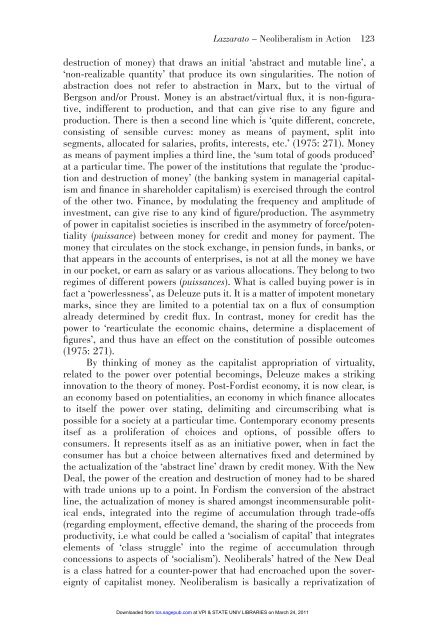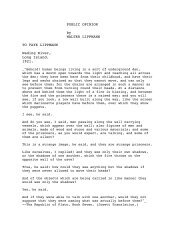Neoliberalism in Action Inequality, Insecurity and the Reconstitution ...
Neoliberalism in Action Inequality, Insecurity and the Reconstitution ...
Neoliberalism in Action Inequality, Insecurity and the Reconstitution ...
Create successful ePaper yourself
Turn your PDF publications into a flip-book with our unique Google optimized e-Paper software.
Lazzarato – <strong>Neoliberalism</strong> <strong>in</strong> <strong>Action</strong> 123<br />
destruction of money) that draws an <strong>in</strong>itial ‘abstract <strong>and</strong> mutable l<strong>in</strong>e’, a<br />
‘non-realizable quantity’ that produce its own s<strong>in</strong>gularities. The notion of<br />
abstraction does not refer to abstraction <strong>in</strong> Marx, but to <strong>the</strong> virtual of<br />
Bergson <strong>and</strong>/or Proust. Money is an abstract/virtual flux, it is non-figurative,<br />
<strong>in</strong>different to production, <strong>and</strong> that can give rise to any figure <strong>and</strong><br />
production. There is <strong>the</strong>n a second l<strong>in</strong>e which is ‘quite different, concrete,<br />
consist<strong>in</strong>g of sensible curves: money as means of payment, split <strong>in</strong>to<br />
segments, allocated for salaries, profits, <strong>in</strong>terests, etc.’ (1975: 271). Money<br />
as means of payment implies a third l<strong>in</strong>e, <strong>the</strong> ‘sum total of goods produced’<br />
at a particular time. The power of <strong>the</strong> <strong>in</strong>stitutions that regulate <strong>the</strong> ‘production<br />
<strong>and</strong> destruction of money’ (<strong>the</strong> bank<strong>in</strong>g system <strong>in</strong> managerial capitalism<br />
<strong>and</strong> f<strong>in</strong>ance <strong>in</strong> shareholder capitalism) is exercised through <strong>the</strong> control<br />
of <strong>the</strong> o<strong>the</strong>r two. F<strong>in</strong>ance, by modulat<strong>in</strong>g <strong>the</strong> frequency <strong>and</strong> amplitude of<br />
<strong>in</strong>vestment, can give rise to any k<strong>in</strong>d of figure/production. The asymmetry<br />
of power <strong>in</strong> capitalist societies is <strong>in</strong>scribed <strong>in</strong> <strong>the</strong> asymmetry of force/potentiality<br />
(puissance) between money for credit <strong>and</strong> money for payment. The<br />
money that circulates on <strong>the</strong> stock exchange, <strong>in</strong> pension funds, <strong>in</strong> banks, or<br />
that appears <strong>in</strong> <strong>the</strong> accounts of enterprises, is not at all <strong>the</strong> money we have<br />
<strong>in</strong> our pocket, or earn as salary or as various allocations. They belong to two<br />
regimes of different powers (puissances). What is called buy<strong>in</strong>g power is <strong>in</strong><br />
fact a ‘powerlessness’, as Deleuze puts it. It is a matter of impotent monetary<br />
marks, s<strong>in</strong>ce <strong>the</strong>y are limited to a potential tax on a flux of consumption<br />
already determ<strong>in</strong>ed by credit flux. In contrast, money for credit has <strong>the</strong><br />
power to ‘rearticulate <strong>the</strong> economic cha<strong>in</strong>s, determ<strong>in</strong>e a displacement of<br />
figures’, <strong>and</strong> thus have an effect on <strong>the</strong> constitution of possible outcomes<br />
(1975: 271).<br />
By th<strong>in</strong>k<strong>in</strong>g of money as <strong>the</strong> capitalist appropriation of virtuality,<br />
related to <strong>the</strong> power over potential becom<strong>in</strong>gs, Deleuze makes a strik<strong>in</strong>g<br />
<strong>in</strong>novation to <strong>the</strong> <strong>the</strong>ory of money. Post-Fordist economy, it is now clear, is<br />
an economy based on potentialities, an economy <strong>in</strong> which f<strong>in</strong>ance allocates<br />
to itself <strong>the</strong> power over stat<strong>in</strong>g, delimit<strong>in</strong>g <strong>and</strong> circumscrib<strong>in</strong>g what is<br />
possible for a society at a particular time. Contemporary economy presents<br />
itsef as a proliferation of choices <strong>and</strong> options, of possible offers to<br />
consumers. It represents itself as as an <strong>in</strong>itiative power, when <strong>in</strong> fact <strong>the</strong><br />
consumer has but a choice between alternatives fixed <strong>and</strong> determ<strong>in</strong>ed by<br />
<strong>the</strong> actualization of <strong>the</strong> ‘abstract l<strong>in</strong>e’ drawn by credit money. With <strong>the</strong> New<br />
Deal, <strong>the</strong> power of <strong>the</strong> creation <strong>and</strong> destruction of money had to be shared<br />
with trade unions up to a po<strong>in</strong>t. In Fordism <strong>the</strong> conversion of <strong>the</strong> abstract<br />
l<strong>in</strong>e, <strong>the</strong> actualization of money is shared amongst <strong>in</strong>commensurable political<br />
ends, <strong>in</strong>tegrated <strong>in</strong>to <strong>the</strong> regime of accumulation through trade-offs<br />
(regard<strong>in</strong>g employment, effective dem<strong>and</strong>, <strong>the</strong> shar<strong>in</strong>g of <strong>the</strong> proceeds from<br />
productivity, i.e what could be called a ‘socialism of capital’ that <strong>in</strong>tegrates<br />
elements of ‘class struggle’ <strong>in</strong>to <strong>the</strong> regime of acccumulation through<br />
concessions to aspects of ‘socialism’). Neoliberals’ hatred of <strong>the</strong> New Deal<br />
is a class hatred for a counter-power that had encroached upon <strong>the</strong> sovereignty<br />
of capitalist money. <strong>Neoliberalism</strong> is basically a reprivatization of<br />
Downloaded from<br />
tcs.sagepub.com at VPI & STATE UNIV LIBRARIES on March 24, 2011





